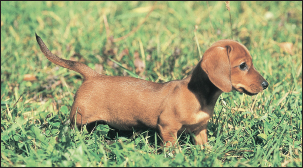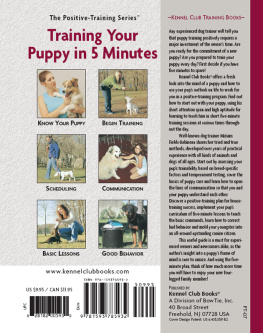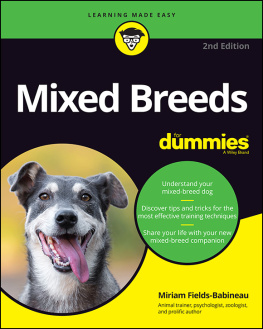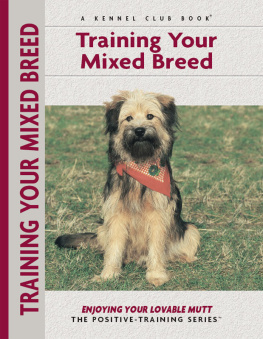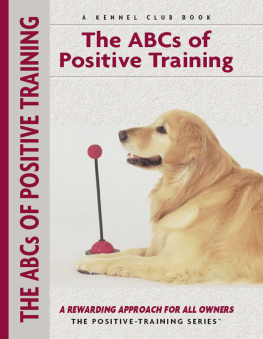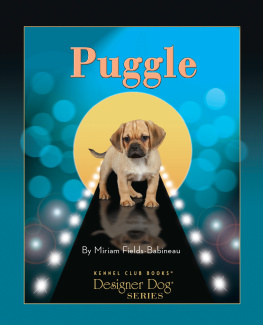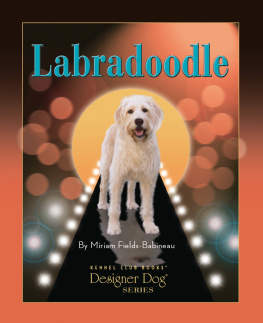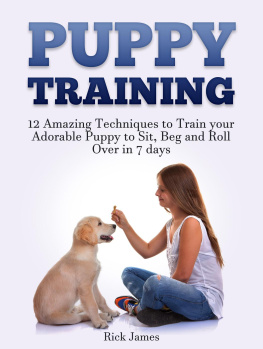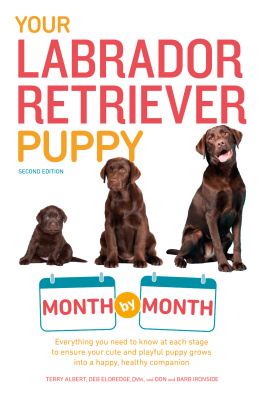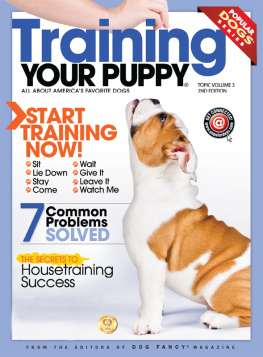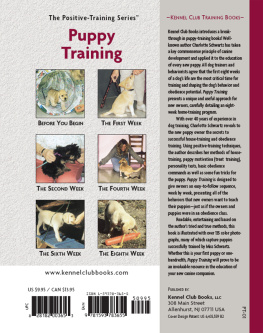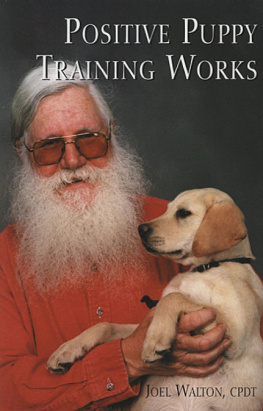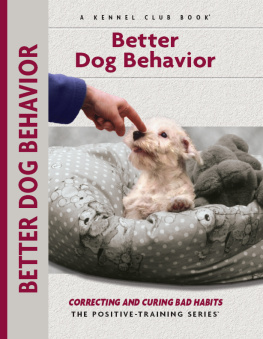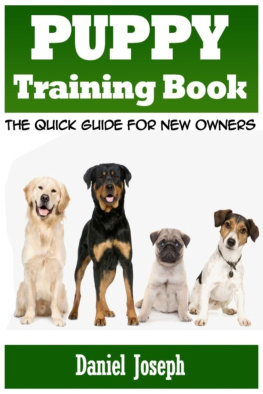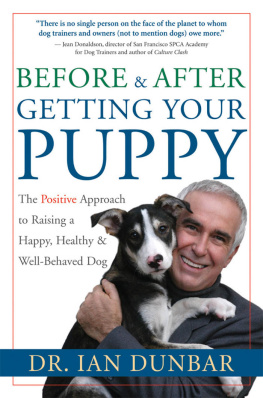AUTHOR BIOGRAPHY
Miriam Fields-Babineau has been training dogs and other animals professionally since 1978. She has owned and operated Training Unlimited Animal Training and Animal Actors, Inc., for 25 years. She teaches people how to communicate with and train their dogs, of any age or breed, specializing in behavioral problem-solving.
Ms. Fields-Babineau has authored many animal-related books, including Dog Training with a Head Halter (Barrons Educational Series, Inc.), the e-book How to Become a Professional Dog Trainer (Intellectua.com), Dog Training Basics (Sterling Publishing Co., Inc.) and many more. She writes numerous articles for trade magazines, such as the award-winning Off-Lead Magazine and Practical Horseman. She has produced the videos The First Hello, which addresses how to prepare a dog for the arrival of an infant, and Dog Training with a Comfort Trainer, which demonstrates how to train a dog using her head-halter design, the Comfort Trainer.
Ms. Fields-Babineau also provides animals for television, film and advertising, having worked with National Geographic, Animal Planet, the History Channel, Warner Films, Orion Films, the Discovery Channel, CBS, the Family Channel and many more. When not training other peoples animal companions, she travels the country, performing in equine and canine competitions as well as exhibiting the skills of her trained felines.
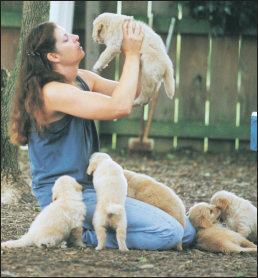
The author, Miriam Fields-Babineau, with Golden Retriever puppies.
Photographs by Evan Cohen, with additional photos by
Bernd Brinkmann, Miriam Fields-Babineau, Isabelle Francais and Carol Ann Johnson.
The publisher would like to thank all of the owners of the dogs featured in this book.
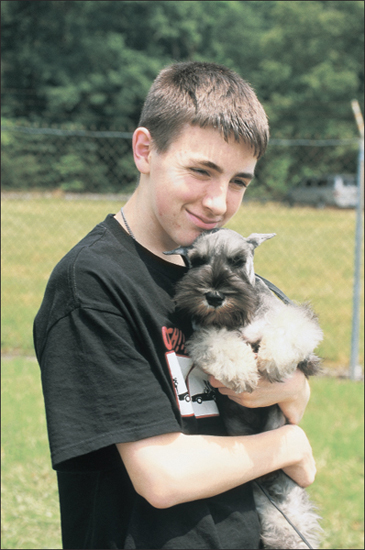
A puppy is truly a new family member, almost like a new baby or a new sibling to the kids.
Getting a puppy is similar to bringing home a new baby. Granted, you dont have to go through pregnancy or labor with a puppy, unless youre the dogs breeder, but you will have to change your life a bit and take the time to turn your puppy into a well-behaved member of the family. As you research what it means to become a puppy owner, you will notice that everyone has an opinion. Whats more, everyone has a different opinion. Even worse, everyone has a different and conflicting opinion. Whos giving the advice you should follow? What will be the right thing to do?
There are many ways to raise a dog. Dogs are versatile, loyal and forgiving. They rarely hold grudges and are always willing to learn. The old adage, You cant teach an old dog new tricks does not ring true for dogs, only for closed-minded people. The best advice: keep an open mind. Ask questions. Try things. Use whatever works best for you and your puppy.
There are many sensible ways that will help you raise this new four-legged child. The first is to be consistent. Always do things the same way. Dogs are creatures of habit. If you are consistent, your pup will learn faster and will listen no matter where you are or what is going on around you. The second is to follow the three Ps of training: patience, persistence and praise.
Exercising the three Ps will get you all the results you desire.
Puppies have an average attention span of approximately five minutes, some shorter, some longer. It is possible to increase a pups attention span, but you will be most successful if you work with your puppy for five minutes at a time, followed by a rest period. Doing this several times a day will achieve results. Your pup will love to work and will gradually increase his attention span, and you will quickly accomplish all of the goals you have in mind for your puppy.
You might ask, How can my puppy learn what he needs in just five minutes? Easily. Use the techniques outlined in this book and you will be successful. Be consistent. Be patient. Be persistent. And praise your puppy whenever he does something good, even if its a little thing.
One of the things that makes dogs one of the most popular pets in the world is their versatility. They can learn to exist in any environment and are ultimately social, intelligent creatures. If you take the time to work with your pup and guide him in the right direction, you will soon have a companion that fits you and your lifestyle.
Knowing as much as you can about where your pup comes from, such as his parentage (breed), early education (kennel where he was born and kept), medical records and nutrition will aid the pups transition into your life. Different breeds have different tendencies toward specific behavior patterns and physical needs. There are many exceptions to the rule, but one can make generalities. If you obtain your pup from a responsible breeder, you can usually be assured of a healthy pup that is typical of his breed and therefore should have certain behavioral characteristics that will help you anticipate his actions and prevent misunderstandings. Lets examine some of the general characteristics of the different groups of dogs, using AKC classification as the basis.
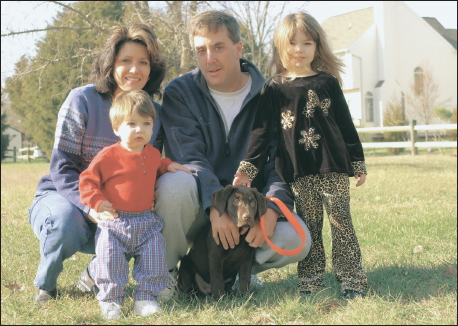
The whole family must devote time to the pup, caring for him and being consistent in what he is taught.
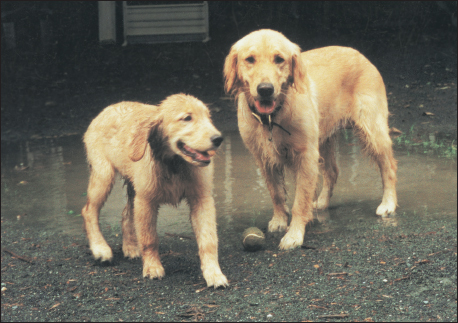
Golden Retrievers are good representatives of the Sporting Group. These are active, outdoor-loving dogs that certainly arent afraid to get their paws wet.
GENERAL BEHAVIORS WITHIN BREED GROUPS
SPORTING GROUP
This group includes the pointers, retrievers, setters and spaniels, as well as the Vizsla and Weimaraner, two all-purpose hunting breeds. Sporting dogs were originally bred to aid hunters. From flushing and fetching to pointing and chasing, sporting dogs are bred for specific hunting conditions and types of game. These breeds have lots of energy, are very loyal and are eager to please. They love people and activities. Most sporting dogs make great family pets because of their ease in training and love of doing things with their owners. They do not do well in homes with children under five years of age, for they are too active and may inadvertently knock small children over, but they can keep up with well-behaved older children for well into their senior years.
Sporting breeds are often very friendly and eager to be part of the family unit. They do not do well if cooped up in small areas for long periods of time or left alone without a chance to play with other dogs and people. They require lots of exercise and do not care about the weather conditions as much as some other breeds. Most, in fact, have been bred to retrieve from the water, so they dont understand why they cannot go out to play on a rainy day. They are high-energy and very demanding of attention. You had better love outdoor activities if you own a sporting dog!
